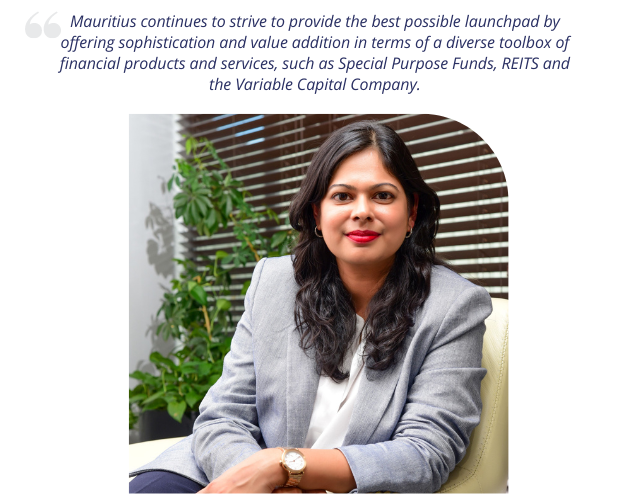Strategically located between Asia and Africa, Mauritius serves as a natural springboard for Asian fund managers and businesses going into Africa, says Rehma Imrith, Commercial Director at IQ-EQ, who recently shared her views at the Business Forum on Private Equity and Fund Management, held as part of Mauritius Finance and Investment Week at Dubai Expo on 8 December 2021.
Rehma highlights that Mauritius continues to strive to provide the best possible launchpad by offering sophistication and value addition in terms of a diverse toolbox of financial products and services, such as Special Purpose Funds, REITS and the Variable Capital Company, and serves as an ideal risk mitigating platform for international investors looking to undertake their investment in Africa.

Mauritius has faced a number of challenges arising from the global pandemic and the FATF and EU listings over the past couple of years. How has the Mauritius IFC sought to overcome these?
The exit of Mauritius from the FATF grey list and EU List of High-Risk Third Countries reinforces its position as a jurisdiction of substance, offering a conducive environment for business, with robust legislation and an innovative product offering for the global financial community. Over the last months, the Mauritius IFC has demonstrated its commitment, resilience and its ability to overcome any challenges being faced.
Whilst it is reassuring to say that we have not witnessed major outflow of Private Equity business, it is true that there has been a slowdown in new business and fund launches, especially those fund managers who were targeting certain European DFIs. It was reassuring to see grandfathering of capital commitments to 31 December 2021 by these DFIs. It is a fact that some of the fund managers have contemplated the transfer of their funds to other jurisdictions such as Luxembourg, Singapore, Netherlands, etc. but they chose to stay in Mauritius on a wait and see mode so long as there was a timeline for the removal from the EU and FATF lists. This again shows the trust in our jurisdiction.
The removal of Mauritius from the FATF and EU lists has restored investor confidence and we are already seeing a positive growth in the private equity space. Existing fund managers are busy with their subsequent funds, new fund managers are back on the road to raise capital and funds which were put on hold are in the process of being incorporated, with a firm launch timeline.
It is important to mention that Mauritius has not waited for the de-listing to pursue its journey as an innovative IFC and continues to strive to provide the best possible launchpad by offering sophistication and value addition in terms of a diverse toolbox of financial products and services, such as Special Purpose Funds, REITS and the Variable Capital Company.
What does Mauritius have to offer as a jurisdiction to Fund Managers?
One of the key attributes of Mauritius which brings a lot of comfort to fund managers and their LPs is the stability of the jurisdiction. The Mauritius IFC has over three decades of experience in servicing the international community, so we are really a tried and tested jurisdiction. Mauritius is home to more than 20,000 global business companies and over 1,000 funds which is testimony of the confidence of international fund managers, institutional investors and DFIs in our jurisdiction.
Mauritius has always been a well-known fund administration domicile for investments into India and is now increasingly used as a springboard for doing business in Africa. Mauritius scores highly when it comes to transparency. It is known for being a country where the rule of law prevails, and the jurisdiction is often cited as a benchmark in the region. There is a hybrid legal system, derived from both common law and civil law. The ultimate court of appeal is the Privy Council in the UK which gives a lot of comfort to the international business community. We have been among the first countries to adopt FATCA and CRS rules.
Mauritius has proactively enhanced its legislation through the various reforms introduced and the acknowledgment by the EU Council reaffirms that Mauritius is always at the forefront in adhering to international standards and is an International Financial Centre of choice and repute.
Why would someone choose Mauritius? Which opportunities are specific to the jurisdiction?
Mauritius serves as an ideal risk mitigating platform for international investors looking to undertake their investment in Africa. It has the benefit of being an African nation without being on the mainland and this brings a number of commercial benefits.
Firstly, the Mauritius IFC offers a plethora of services, in a well-regulated and conducive eco-system at reasonable costs. It offers full protection of foreign investments through its network of Investment Promotion and Protection Agreements and access to 46 Double Taxation Treaties.
Mauritius is a founding member of several African regional groups, with the two most important ones being SADC and COMESA. Through these memberships, Mauritius provides foreign entrepreneurs preferential market access and other trade advantages. Mauritius is a strong economic partner amongst sub-Saharan African countries and centre for business and investment into the continent.
Mauritius is also part of the African Continental Free Trade Area which was launched at the beginning of the year and which presents an exciting game changer for African trade. Currently, Africa accounts for only 2% of global trade and only 17% of African exports are intra-continental, compared with 59% for Asia and 68% for Europe. The main purpose of this free trade area is to allow free access to commodities, goods, and services across the continent. It is thus undeniable that this will add further to the attractiveness of Africa as a place to do business and the African Continental Free Trade Area provides a platform for Mauritius to contribute significantly to the new African impetus by making available to investors and businessmen an ecosystem that not only makes it easier for them to do business with Africa, but also enhances and safeguards their investments.
Strategically located between Asia and Africa, it serves as a natural springboard for Asian fund managers and businesses going into Africa. On this point, earlier this year, Mauritius has signed a Comprehensive Economic Cooperation and Partnership Agreement (CECPA) with India. This is the first trade agreement signed by India with an African country. The CECPA aims to provide the institutional mechanism that will encourage and improve trade in goods and services, and economic cooperation between the two countries, which already share cultural and historical links. In addition to preferential access to products and services in Mauritius, Indian businesses can leverage the core competencies, and strategic location of Mauritius to open up to new horizons and use Mauritius as a stepping stone to tap into the African continent.
Mauritius also signed a Free Trade Agreement (FTA) with China in October 2019, recognising the need to partner with China. It is the first FTA that China has signed with an African country which has as its objective to ease barriers to trade in goods and services, investment and economic cooperation.
Mauritius is an enticing and cost-effective trade and business hub, where operators are able to leverage Free Trade Agreements and make goods accessible to a market of 36 member states and more than 900 million people, and a combined GDP of over USD 850 billion. Businesses and entrepreneurs involved in intra-Africa trade, or willing to reach African markets, and that use the Mauritian jurisdiction can benefit from trade gains, economies of scale, increased returns, market enlargement and optimised costs.
These Free Trade Agreements with India and China complement the regional trading blocs. Mauritius serves as a bridge which gives the continent access to huge consumer markets in India and China, allowing them to export goods and services. Mauritius is a connector between Asian private investments and African markets.
What role is Mauritius playing to facilitate impact investing in Africa?
The Private Equity impact investing market in Africa and other emerging markets is gaining momentum as the continent offers investment opportunities in various sectors such as agri-business, education, technology, infrastructure, renewable energy and food poverty eradication, amongst others. This is increasingly changing the investment dynamics in Africa, with Development Finance Institutions (DFIs) ensuring that corporate governance becomes integral to attracting investment flows.
Mauritius already plays a pivotal role by facilitating impact investments on the continent. It provides the comprehensive governance framework that DFIs require and at the same time the platform for financial capital to flow to the right investee companies or projects in Africa. In fact, many of the impact funds are already domiciled and administered in Mauritius, underlining the contribution of the country to the continued development of the continent.
It is important for Mauritius to continuously develop new product offerings to adapt to the needs of investors. Increasingly, we see that investors using the Mauritius IFC for onward investment have a sustainable or ESG agenda. For example, the recently published Bank of Mauritius Guide on sustainable bonds is forward-looking and will ensure that potential issuers can use the Mauritius IFC as their preferred jurisdiction to raise funds for such projects.
More broadly, Mauritius is actively seeking to bring ESG themes into its framework for international business. Our proximity to and business access for Africa means that we have a regional view in setting the tone here. At IQ-EQ, we provide a comprehensive ESG suite of services including ESG Health Check, ESG Reputational Assessment, drafting the policies and framework and ESG Reporting.
How can Mauritius reinforce its position as the hub for Private Equity and Fund Management?
Looking forward, the Mauritius IFC should constantly look to innovate and bring in new specialist products and expertise in the fund industry.
Mauritius is already well known as an attractive fund administration jurisdiction and is well poised to move up the value chain to position itself as the middle office provider to funds in the region. Currently, this function is not really carried out by the fund administrator but is handled in-house by the fund manager. Mauritius already has the talent pool and infrastructure as the major fund administration players have invested massively on technology.
What we really need is a well-spelt out value proposition and proper marketing to provide an alternative solution to middle-office services, including outsourced CFO solutions being undertaken in the USA, Luxembourg and Singapore for example.
